Opinion: City’s Kaiser Center 99-Year Lease Proposal “Lacks in Benefits to Marginalized Communities”
Jul 4, 2019
Posted in Economic Development, Gentrification, History and remembering, Libby Schaaf

By Ayodele Nzinga, MFA, Ph.D.
In 2014, the City of Oakland issued an RFP for the redevelopment of the Henry J Kaiser Center and Calvin Simmons Auditorium. Two proposals were considered. One was a detailed a robust reuse of the historic site with “baked in community benefit”, and self-accessed itself to supplement funding for cultural affairs.
The other proposal offered a less defined plan for the use of the site, and at one point considered market rate offices and perhaps a brewery as a use for the refurbished building.
The city accepted the latter proposal and entered into a relationship with Orton Development in 2015 and has bent over backward ever since to accommodate shifting iterations of the project now described as arts and nonprofit offices with a 1,500-seat theater.
In April 2019, the Community Coalition for Equitable Development filed an appeal opposing the April 3rd, 2019 Planning Commission decision granting Orton Development a Conditional Use Permit and clearing the way for the negotiation of a 99-year lease between the Developer and the City, privatizing this public site for the length of the agreement.
The appeal, which is scheduled to be heard by City Council this month, cites a failure on the part of the developer to engage stakeholders, calls out a lack of benefit to marginalized communities, questions the benefit to the City of Oakland, and was fueled in part by the city’s failure to enact its equity policies regarding the use of publicly owned property.
The negotiations between CCED and the developer have become a struggle, not over the levels of the anemic concessions contained in the term sheet of a project that was not designed with equity as a lens; but for a way to construct mechanisms that animate and implement some of the equity strategies the city has yet to employ.
Oakland changed between 2014 and 2019. The change is easy to observe in the correlation of the proliferation of cranes in the sky, the not so subtle change in the city’s demographics, and the rising price of living working and creating in The Town. Oakland is booming, but the effect of the boom doesn’t benefit all Oaklanders equally. Oakland has an equity problem. It has studied the root causes of these prevalent inequities, and crafted strategies informed by data and best practices to mitigate displacement and create more equitable outcomes.
The problem is, that as of this moment, the city does not seem to have found a way, or lacks the will, to implement the equity strategies outlined in multiple city policies, documents, and guidelines.
An approach suggested in the Mayor’s Task Force on Arts, and Housing suggests that the City utilize existing properties or buy properties on which to create equitable outcomes for artists at risk of displacement. The Calvin Simmons and the Henry J Kaiser represent unique opportunities to implement equity strategies. They offer an opportunity for the City to do a better job for the community than they did with the Fox, which presents an insurmountable access barrier in the price of production for the few days a year it is available to the community.
This project has become subject to Oakland’s Art Ordinance percent and is subject to the city Impact fee on new development, both grandfathered in. However, the developer was never instructed to use an equity lens. At what point does a failure to enact policy become a form of benign neglect?
The Henry J. Kaiser Center appeal is scheduled to be heard by City Council on July 9.
Ayodele Nzinga, MFA, Ph.D. is executive producing director of the the Lower Bottom Playaz, Inc.